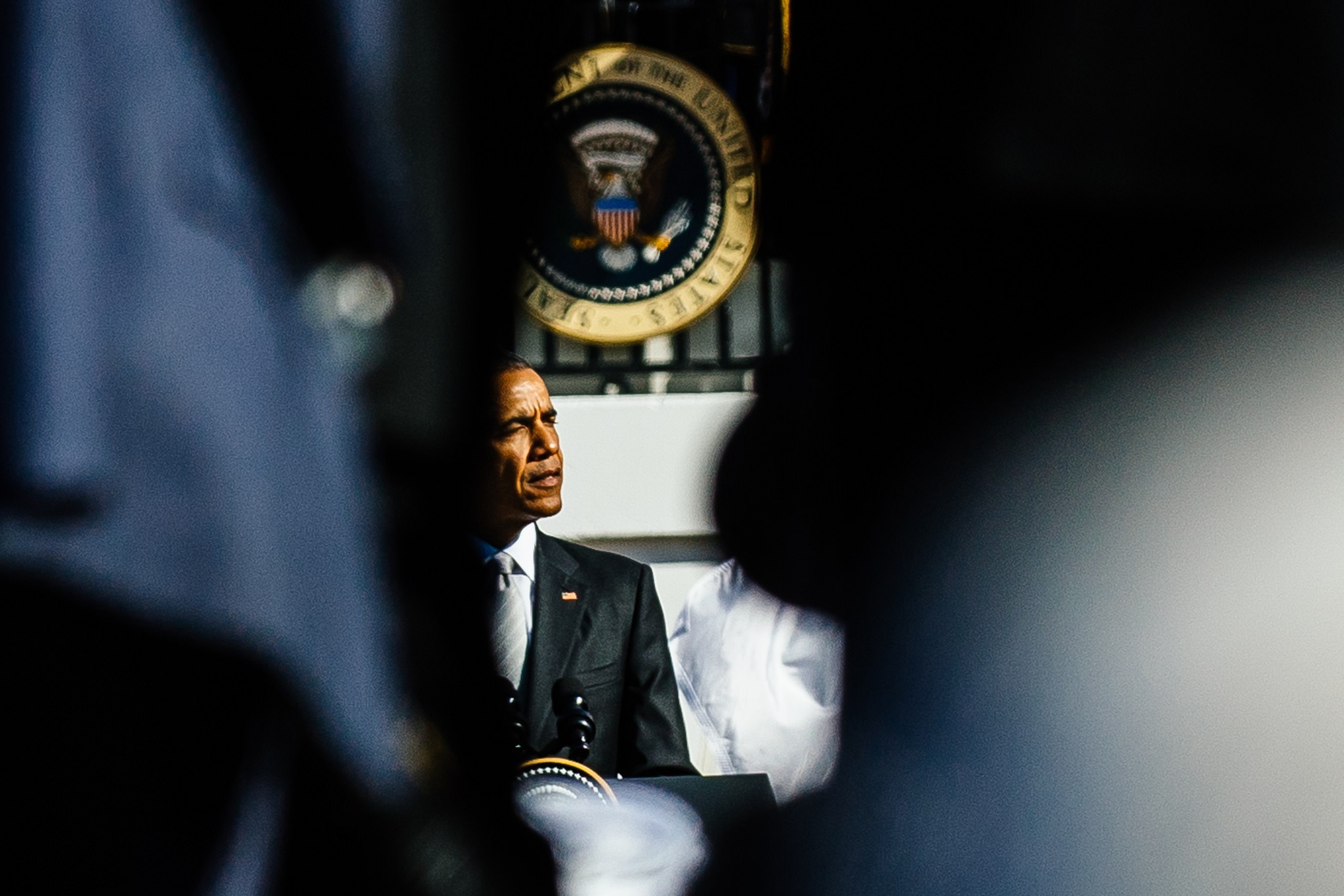Photo Credit: Robb Hohmann
For those concerned that the United States is in danger of another terrorist attack, President Obama has two words for you: chill out. World War III won’t be ignited by the crumbling Islamic State in Iraq and Syria (ISIS).
“Masses of fighters on the back of pickup trucks and twisted souls plotting in apartments or garages pose an enormous danger to civilians and must be stopped,” the president assured Americans on Tuesday during his final State of the Union address. “But they do not threaten our national existence.”
“That’s the story [ISIS] wants to tell; that’s the kind of propaganda they use to recruit,” Obama said.
Obama’s statements on terrorism are critical to a party trying to reassure a nation in fear. With a little less than a year before the presidential election, Democrats have found themselves in a precarious position: the party lags behind the GOP in public opinion polls on counterterrorism strategy, and has to win over a public that believes another major domestic terrorist attack is on the horizon. Obama offered his fellow Democrats an example of how to take a more measured approach to ISIS while still taking into account the public’s insecurities.
In the past few months, fears of an imminent strike have risen to post-9/11 levels, with one poll showing 79 percent of Americans believe that an attack is “very or somewhat likely” within the coming months. Nearly 30 percent cite either the Islamic State in Iraq and Syria, national security, or terrorism as the most important problem facing the United States. And they’re less trusting of the government’s ability to stop an attack.
The president’s speech on Tuesday was clearly inspired by the Republican Party’s presidential candidates’ obsession with militant Islamic extremists. For Democrats, the past couple of months of campaigning have given rise to a growing awareness that a more disinterested and realistic perspective on ISIS, with no acknowledgment of the public’s fears, is not tenable. The public’s insecurity has given Republican candidates an opening. As a result, we have a veritable cornucopia of nuttery: Donald Trump’s “database o’ Muslims” plan (may we suggest a binder instead?); Ben Carson’s bizarre assertion that any Muslim who wishes to be president would have to “renounce the tenets of Islam”; Jeb Bush’s demand that Syrian refugees “prove” they are Christian; Ted Cruz’s approval of Donald Trump’s proposed ban on Muslims entering the country.
Indeed, for the GOP, the fact that the Obama administration—let alone a Democratic candidate running for president—would care about anything other than terrorism (and maybe job creation) is perceived as deeply suspicious.
Voters don’t care if these security schemes are balderdash—they’re afraid, and nearly any promise of security, even if it’s over-the-top and downright racist, will do. And while Democrats have no chance at wooing the hardened defenders of anti-Islam bigotry from the Republican Party, Democrats do find themselves needing a rhetorical middle ground between being “tough on terror” and treating the public’s anxieties as overwrought.
Obama has routinely come under fire from the right for allegedly downplaying the threat posed by ISIS. Republicans have latched on to the president’s comments dubbing the group a “J.V. team” and his opposition to sending troops into Syria, presenting them as evidence that the current administration has been weak on terror. The administration took another hit when, prior to the Paris attacks in mid-November, the president declared ISIS had been “contained.” In recent weeks, he’s used stronger rhetoric: ISIS, he said Tuesday, must be “rooted out, hunted down, and destroyed.” He cited the killing of Osama bin Laden and of Nasir al-Wuhayshi, as well as the capture of Ahmed Abu Khattala, as examples.
Hillary Clinton, the administration’s former secretary of state, has followed in the president’s footsteps to a degree, throwing her support behind current counterterrorism strategy while berating the Republicans for “promising to carpet bomb until the desert glows.” In what is presumably an effort to woo progressive Democrats—many of whom view her as too hawkish—she’s also come out in favor of limiting United States military presence on the ground in the Middle East. (A “no-fly zone” in northern Syria is A-O.K.) She has leveled some criticism against the administration for its more reserved Syria policy, which Obama reportedly referred to as “horseshit.”
Bernie Sanders has taken a slightly different route, advocating that the United States take a “backseat” role in the war against ISIS; he opposes the no-fly zone in Syria.
Playing up the threat terrorism poses to the United States and its citizens isn’t only disingenuous—it’s also counterproductive, according to some observers. “The public has internalized the impact of 9/11,” wrote political scientists John Mueller and Mark Stewart in Foreign Affairs last month. They noted that politicians should make more effort to put the threat posed by terrorism into context, but they were unsure whether doing so would have much of an effect on the public’s perception of the threat.
“Do we overemphasize terror? Yes. But there’s not much government can do about that. It’s a different kind of violence,” Juliette Kayyem, a former assistant Homeland Security secretary under the Obama administration, told The New York Times. “It’s a different kind of violence. It’s meant to elicit fear. So the fact that it does elicit fear is hard to refute.”
At the very least, whoever emerges as the Democratic nominee would do well to heed Obama’s example in the SOTU. Don’t give them more reasons to be scared.
Hannah Gais is associate digital editor at The Washington Spectator.







0 Comments